Related Research Articles
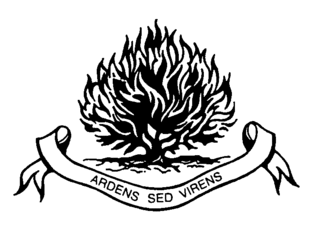
Presbyterianism is a part of the Reformed tradition within Protestantism that traces its origin to the Church of Scotland. Presbyterian churches derive their name from the presbyterian form of church government by representative assemblies of elders. Many Reformed churches are organised this way, but the word Presbyterian, when capitalized, is often applied uniquely to churches that trace their roots to the Church of Scotland or to English Dissenter groups that formed during the English Civil War.
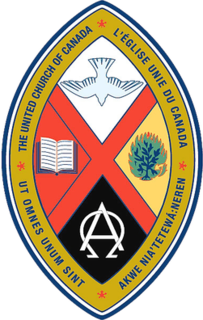
The United Church of Canada is a mainline Protestant denomination that is the largest Protestant Christian denomination in Canada and the second largest Canadian Christian denomination after the Catholic Church in Canada.

The African Methodist Episcopal Church, usually called the AME Church or AME, is a predominantly African-American Methodist denomination. It adheres to Wesleyan-Arminian theology and has a connexional polity. The African Methodist Episcopal Church is the first independent Protestant denomination to be founded by black people, though it welcomes and has members of all ethnicities. It was founded by Richard Allen (1760–1831) - later elected and ordained first bishop in Philadelphia, Pennsylvania, in 1816 from calling together of five black congregations of the earlier established Methodist Episcopal Church on the East Coast / Middle-Atlantic states area in the first General Conference, who wanted to escape the discrimination that was commonplace in society. It was among the first denominations in the United States to be founded for this reason, rather than for theological distinctions, and has persistently advocated for the civil and human rights of African Americans through social improvement, religious autonomy, and political engagement, while always being open to people of all racial backgrounds. Allen, an previously ordained Deacon in the Methodist Episcopal Church, was elected by the gathered ministers and ordained / consecrated as its first bishop in 1816 by the first General Conference of the five churches - extending from the three in the Philadelphia area in Pennsylvania to one in Delaware and one in Maryland of Baltimore. The denomination then expanded west and through the South, particularly after the American Civil War (1861–1865). By 1906, the AME had a membership of about 500,000, more than the combined total of the two other predominantly Black American denominations - the Colored Methodist Episcopal Church in America and the African Methodist Episcopal Zion Church, making it the largest major African-American denomination of the Methodist traditions.

The Christian Reformed Church in North America is a Protestant Christian denomination in the United States and Canada. Having roots in the Dutch Reformed Church of the Netherlands, the Christian Reformed Church was founded by Dutch immigrants in 1857 and is theologically Calvinist.

The Free Church of Scotland is a Scottish denomination which was formed in 1843 by a large withdrawal from the established Church of Scotland in a schism or division known as the Disruption of 1843. In 1900, the vast majority of the Free Church of Scotland joined with the United Presbyterian Church of Scotland to form the United Free Church of Scotland. In 1904 the House of Lords judged that the constitutional minority that did not enter the 1900 union were entitled to the whole of the church's patrimony, the Free Church of Scotland acquiesced in the division of those assets, between itself and those who had entered the union, by a Royal Commission in 1905. Despite the late founding date, Free Church of Scotland leadership claims an unbroken succession of leaders going all the way back to the Apostles.

The mainline Protestant churches are a group of Protestant denominations in the United States that contrast in history and practice with evangelical, fundamentalist, and charismatic Protestant denominations. Some make a distinction between "mainline" and "oldline", with the former referring only to denominational ties and the latter referring to church lineage, prestige and influence. However, this distinction has largely been lost to history and the terms are now nearly synonymous.
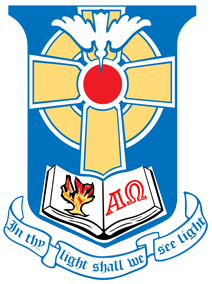
The Associate Reformed Presbyterian Church (ARPC), as it exists today, is the historical descendant of the Synod of the South, a Synod of the Associate Reformed Church. The original Associate Reformed Church resulted from a merger of the Associate Presbytery and most of the Reformed Presbytery in Philadelphia in 1782. The northern Synods eventually merged with the forebearers of the Presbyterian Church (USA). Because of its 1782 date of origin, it is one of the oldest of the United States' theologically and socially conservative denominations.

The Presbyterian Church in Canada is a Presbyterian denomination, serving in Canada under this name since 1875. The United Church of Canada claimed the right to the name from 1925 to 1939. According to the Canada 2001 Census 409,830 Canadians identify themselves as Presbyterian, that is, 1.4 percent of the population.
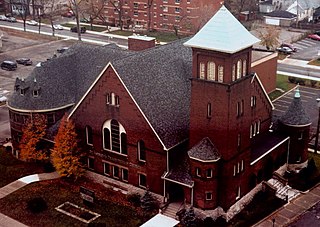
St. Andrew's Presbyterian Church, is a Presbyterian Church in Canada congregation in downtown Windsor, Ontario, Canada. The congregation dates back to 1857, and at one time, was the largest congregation by membership within the Presbyterian Church in Canada (PCC).

Covenant Theological Seminary, sometimes known as Covenant Seminary, is the denominational seminary of the Presbyterian Church in America (PCA) and it is located in Creve Coeur, Missouri. Covenant trains leaders for work in the church and the world — especially as pastors, missionaries, and counselors. It does not require all students to be members of the PCA, but it is bound to promote the teachings of its denomination. Faculty must subscribe to the system of biblical doctrine outlined in the Westminster Standards.

The Free Church of Scotland is an evangelical, Calvinist denomination in Scotland. It was historically part of the original Free Church of Scotland that remained outside the union with the United Presbyterian Church of Scotland in 1900. Now, it remains a distinct Presbyterian denomination in Scotland.
Calvinistic Methodists were born out of the 18th-century Welsh Methodist revival and survive as a body of Christians now forming the Presbyterian Church of Wales. Calvinistic Methodism became a major denomination in Wales, growing rapidly in the 19th century, and taking a leadership role in the Welsh Religious Revival of 1904-5.
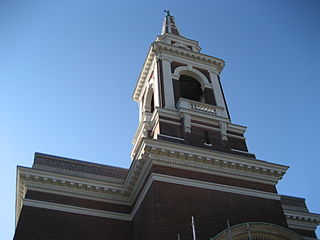
Central Presbyterian Church is a Presbyterian Church in Canada congregation in Hamilton, Ontario, Canada, located in the downtown area at the corner of Charlton and Caroline Street South.
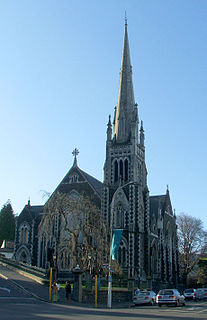
Knox Church is a notable building in Dunedin, New Zealand. It houses the city's second Presbyterian congregation and is the city's largest church of any denomination.

Arch Street Presbyterian Church is a historic Presbyterian Church at 1724 Arch Street, located between the two Comcast skyscrapers in the Logan Square neighborhood of Philadelphia, Pennsylvania. The building was designed by the architectural firm of Hoxie & Button, and built in 1855. It is a one-story, Classical Revival style building with Greek and Roman elements. It features a portico supported by four Corinthian order columns and a coffered dome.

William Arnot (1808–1875) was a Scottish minister and theological writer. He served in the Church of Scotland but moved to the Free Church at the Disruption.

The Presbyterian Historical Society (PHS) is the oldest continuous denominational historical society in the United States. Its mission is to collect, preserve and share the history of the American Presbyterian and Reformed tradition with the church and broader community. It is a department of the Office of the General Assembly of the Presbyterian Church (U.S.A.).
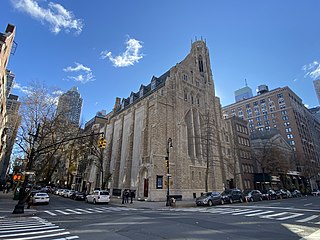
Central Presbyterian Church is a historic congregation on the Upper East Side of Manhattan in New York City, founded by pastor and abolitionist William Patton in 1821. It is a member of the Evangelical Presbyterian Church, and it worships in a Gothic Revival structure completed in 1922 that was originally commissioned and largely funded by John D. Rockefeller, Jr. as Park Avenue Baptist Church.

The Unitarian Church in Ireland presently consists of two Congregations, Dublin and Cork, part of the Synod of Munster, in the Republic of Ireland, which has itself been part the Non-Subscribing Presbyterian Church of Ireland since 1935. Some congregations remain closely associated with the General Assembly of Unitarian and Free Christian Churches. These churches would abide by the traditional Unitarian principles of Freedom, Reason and Tolerance.

The First Universalist Church of Atlanta, organized in 1895, re-established a Universalist presence in Atlanta, Georgia. Initial missionary efforts in 1879 were short-lived and failed to establish a permanent presence in the city. With the explicit assistance the Young People's Christian Union, this second missionary effort enabled the Universalists to sustain their presence and construct a church building on East Harris in 1900. The Universalists occupied the church until 1918 when they merged with Atlanta's Unitarians.
References
- ↑ "David Harris chosen new editor of the Presbyterian Record. (PCC News)". The Free Library.
- ↑ THE ACTS AND PROCEEDINGS OF THE ONE HUNDRED AND FORTIETH GENERAL ASSEMBLY OF THE PRESBYTERIAN CHURCH IN CANADA WATERLOO, ONTARIO MAY 30TH – JUNE 2ND, 2014
- ↑ "Goodbye to the Record". The Presbyterian Record. September 26, 2016.
- ↑ "The Record to fold after 140 years". MastheadOnline. September 27, 2016.